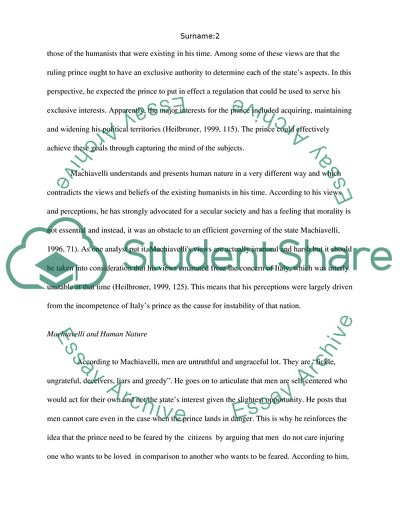Cite this document
(Political Theories: Machiavellis Prince and Aristotles Politics Book Report/Review Example | Topics and Well Written Essays - 2750 words, n.d.)
Political Theories: Machiavellis Prince and Aristotles Politics Book Report/Review Example | Topics and Well Written Essays - 2750 words. https://studentshare.org/politics/1809734-compare-and-contrast-aristotles-and-machiavellis-theories-on-how-to-correctly-distinguish-between-1-legitimate-political-goals-and-2-manipulated-images-in-the-mind-of-the-oppressed
Political Theories: Machiavellis Prince and Aristotles Politics Book Report/Review Example | Topics and Well Written Essays - 2750 words. https://studentshare.org/politics/1809734-compare-and-contrast-aristotles-and-machiavellis-theories-on-how-to-correctly-distinguish-between-1-legitimate-political-goals-and-2-manipulated-images-in-the-mind-of-the-oppressed
(Political Theories: Machiavellis Prince and Aristotles Politics Book Report/Review Example | Topics and Well Written Essays - 2750 Words)
Political Theories: Machiavellis Prince and Aristotles Politics Book Report/Review Example | Topics and Well Written Essays - 2750 Words. https://studentshare.org/politics/1809734-compare-and-contrast-aristotles-and-machiavellis-theories-on-how-to-correctly-distinguish-between-1-legitimate-political-goals-and-2-manipulated-images-in-the-mind-of-the-oppressed.
Political Theories: Machiavellis Prince and Aristotles Politics Book Report/Review Example | Topics and Well Written Essays - 2750 Words. https://studentshare.org/politics/1809734-compare-and-contrast-aristotles-and-machiavellis-theories-on-how-to-correctly-distinguish-between-1-legitimate-political-goals-and-2-manipulated-images-in-the-mind-of-the-oppressed.
“Political Theories: Machiavellis Prince and Aristotles Politics Book Report/Review Example | Topics and Well Written Essays - 2750 Words”. https://studentshare.org/politics/1809734-compare-and-contrast-aristotles-and-machiavellis-theories-on-how-to-correctly-distinguish-between-1-legitimate-political-goals-and-2-manipulated-images-in-the-mind-of-the-oppressed.


